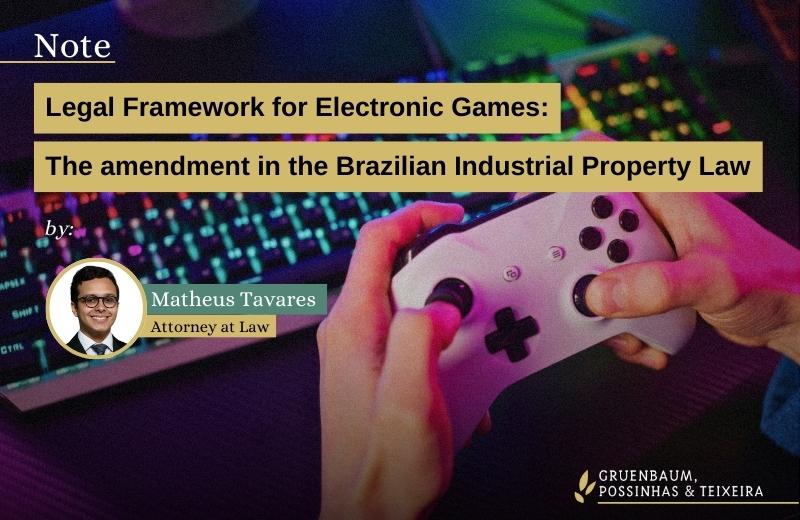Legal Framework for Electronic Games: The amendment in the Brazilian Industrial Property Law

The recent Law No. 14,852, enacted on May 3, 2024, brought significant changes to the electronic games sector. One of the most interesting innovations was the inclusion of electronic game registration within the scope of BPTO’s jurisdiction, amending Article 2 of the Industrial Property Law (LPI). This change raises important discussions about rights protection in Brazil, especially considering that some aspects of electronic games have been regulated by copyright law, which does not require registration for protection. Furthermore, the new law confuses the definition of “electronic game,” encompassing both software and hardware under the same term, ignoring their regulatory differences. This presents challenges for BPTO, which will need to establish clear norms to handle these specificities. Read the note below the complete analysis by our attorney Matheus Tavares on the implications of this change, and better understand the impacts for the legal sector and companies in Brazil.
Law No. 14,852, enacted on May 3, 2024, created the legal framework for electronic games, establishing protective and regulatory provisions regarding the matter.
An interesting and controversial innovation was the inclusion of a new section in article 2 of Law 9,279/96 (Industrial Property Law), which provides for the modalities of protection of rights relating to industrial property, bringing the “granting of registration for electronic games” to the scope of the Brazilian Patent and Trademark Office (BPTO).
The innovation is peculiar, because although electronic games have been the subject of discussion within the scope of Intellectual Property, which encompasses Industrial Property and Copyrights, the topic has been mostly regulated by the latter, which does not depend on registration for the effectiveness of its protection, thus differentiating itself from industrial property rights (BPTO’s scope), which establishes registration as a mandatory condition for acquiring ownership.
At the same time, it is important to highlight that Law No. 9,609 (Software Law) established the possibility for computer programs to be registered with the BPTO. It is necessary to note that registration was established as an option, not mandatory. Furthermore, there was no change in the law either. Because of this, even though it could be registered optionally, its treatment was still under the copyright law, by provision of the law itself (article 2, of the Software Law), and not an industrial property right.
Another problem is the fact that the law brings software and hardware into the same definition of “electronic game”, and these are terms that are not to be confused, regulated, as a rule, by different protections: hardware, as an invention, has protection by patent. The software itself (algorithm, source code and specific language), in turn, is protected in Brazil by the copyright institute and cannot be patentable by express prohibition of the Brazilian Industrial Property Law. At this point, it is worth differentiating the “software patent”, which is the protection of the invention implemented by the program, through its execution method. In this case, if there is novelty, inventive activity and industrial application, it may also be protected by patent. Therefore, the incidence of different legislations is observed: Industrial Property Law (9279/96), Software Law (9609/98) and Copyright Law (9610/98).
Furthermore, under a semantic analysis, the expression used in the new section, “granting of registration”, seems to bring another lack of technicality in relation to electronic games as hardware and method implemented by software, since the protection of inventions or utility models is affected by the granting of patent, not registration. An invention, duly granted by the BPTO, will have a letters-patent, not a certificate of registration.
It is clear, therefore, that the BPTO will need to regulate the matter internally, mainly due to the fact that the law has made a high generalization of basic concepts of Intellectual Property, ignoring technical and procedural specificities.
